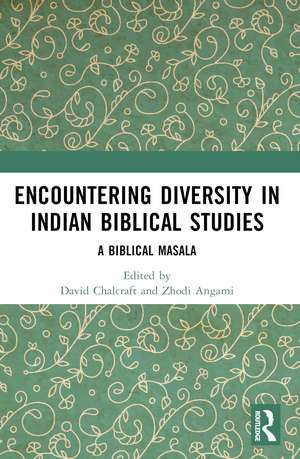Encountering Diversity in Indian Biblical Studies: A Biblical Masala
Editat de David J. Chalcraft, Zhodi Angamien Limba Engleză Paperback – 28 oct 2024
Encountering Diversity in Indian Biblical Studies will be of interest to students, scholars and researchers working on post-colonial biblical studies and diversity in Christianity, particularly in the Indian context.
| Toate formatele și edițiile | Preț | Express |
|---|---|---|
| Paperback (1) | 314.44 lei 3-5 săpt. | +33.70 lei 5-11 zile |
| Taylor & Francis – 28 oct 2024 | 314.44 lei 3-5 săpt. | +33.70 lei 5-11 zile |
| Hardback (1) | 901.16 lei 6-8 săpt. | |
| Taylor & Francis – 20 mar 2023 | 901.16 lei 6-8 săpt. |
Preț: 314.44 lei
Nou
Puncte Express: 472
Preț estimativ în valută:
60.18€ • 62.59$ • 49.68£
60.18€ • 62.59$ • 49.68£
Carte disponibilă
Livrare economică 24 martie-07 aprilie
Livrare express 08-14 martie pentru 43.69 lei
Preluare comenzi: 021 569.72.76
Specificații
ISBN-13: 9781032383507
ISBN-10: 103238350X
Pagini: 402
Ilustrații: 66
Dimensiuni: 156 x 234 x 27 mm
Greutate: 0.74 kg
Ediția:1
Editura: Taylor & Francis
Colecția Routledge
Locul publicării:Oxford, United Kingdom
ISBN-10: 103238350X
Pagini: 402
Ilustrații: 66
Dimensiuni: 156 x 234 x 27 mm
Greutate: 0.74 kg
Ediția:1
Editura: Taylor & Francis
Colecția Routledge
Locul publicării:Oxford, United Kingdom
Public țintă
Academic, Postgraduate, and Undergraduate AdvancedRecenzii
'A fascinating concoction of articles looking at interpretations of the Bible in India, past and present, Encountering Diversity in Indian Biblical Studies is a timely look at a rich, cultural stream of biblical interpretation. A post-colonial lens is used to examine different contextual readings with national, ethnic and social identities all with roles to play. Older colonial, Protestant, Catholic, Dalit and Tribal exegetical approaches are also compared in conjunction with new anthropological, ethnographic and visual modes of enquiry. Everyday life is never far away, with the recognition of the part played by symbols and the senses in interpreting the Bible and the world around us. What other book would feature the biblical approaches of rickshaw drivers?! This is a rich and diverse reading experience, not to be missed!' - Katharine J. Dell, Professor of Old Testament Literature and Theology, Faculty of Divinity, University of Cambridge
Cuprins
A Biblical Masala: An Orientation to Our Book, David J. Chalcraft; SECTION I: Historical Episodes of Biblical Studies in India from a British Perspective; 1. Strategies Past, Present and Future: The Context and Variety of Biblical Studies in Indian Culture and Society, David J. Chalcraft; 2. English and Indian Readings of Naboth’s Vineyard: The Role of Identity and Context in the Sociological Meaning and Use of Biblical Texts, David J. Chalcraft; 3. Nation and Text: The Biblical Roots of Hindu Nationalism, Hugh S. Pyper; SECTION II: Readings with a Social Conscience; 4. Holiness School’s Response to Economic Injustice: Reading Leviticus 25 in the Multi-Religious and Cultural Context of India, P. Joseph Titus; 5. A Dialogue between Indian and Biblical Social Settings: Reading the Two Parables of Rich Men (Luke 12.16-21 and 16.19-31) Contextually, V.J. John; SECTION III: Dalit/Madiga Hermeneutics; 6. The Context of Dalit Christians in Rural Andhra Pradesh: Christian Faith, Caste and Culture, Jeeva Kumar Ravela; 7. Encountering the Bible: Listening to the Voices of Madiga Christians, Jeeva Kumar Ravela and David J. Chalcraft; 8. Why Are Times Not Kept by the Almighty?’ – Job, Violence and God: A Dalit Contextual Reading of Job 24, Jeeva Kumar Ravela; SECTION IV: Tribal Hermeneutics; 9. An Introduction to Tribal Interpretation of the Bible, Zhodi Angami; 10. Reading Amos 6.1-7 in the Light of Mizo Values and Ethos, K. Lallawmzuala; 11. Seeing Jesus through Tribal Eyes, Zhodi Angami; 12. A Tribal God for a Tribal People: Reading the Creation Narratives of Genesis and the Prologue of John’s Gospel from an Angami Perspective, Zhodi Angami; SECTION V: An Empirical Turn? The (Visual) Ethnography of Biblical Encounter; 13. The Use of the Bible in the Institutional Body Language of Christian Schools in India: Mediating Western; Christian; or Western-Christian Culture in Contemporary India?, Sally Elton-Chalcraft; 14. ‘Bad Fellows’ Doing a ‘Cursed Job’: Reading the Bible with ‘Ordinary’ Autowallahs in Chennai, Arren Bennet Lawrence.
Notă biografică
Zhodi Angami is Professor of New Testament and Dean of Postgraduate Studies at Eastern Theological College, Jorhat, India. He earned a PhD in New Testament from the University of Divinity, Australia. His special areas of interest are Jesus, the Gospels, the history and formation of the Bible and tribal interpretation of the Bible. His publications include Tribals, Empire and God: A Tribal Reading of the Birth of Jesus in Matthew’s Gospel (2017) and The Making of the Bible (2017).
David J. Chalcraft is Professor of Sociology at Liverpool John Moores University, UK, and formerly Chair of Biblical Studies at the University of Sheffield (2011-2014). He has long been associated with the analysis of classical sociology and with the use of sociology in biblical studies, editing such volumes as Social Scientific Old Testament Criticism (1995), Sectarianism in Early Judaism: Sociological Advances (2007) and Theories, Methods and Imagination (with Frauke Uhlenbruch and Rebecca S Watson) (2014).
David J. Chalcraft is Professor of Sociology at Liverpool John Moores University, UK, and formerly Chair of Biblical Studies at the University of Sheffield (2011-2014). He has long been associated with the analysis of classical sociology and with the use of sociology in biblical studies, editing such volumes as Social Scientific Old Testament Criticism (1995), Sectarianism in Early Judaism: Sociological Advances (2007) and Theories, Methods and Imagination (with Frauke Uhlenbruch and Rebecca S Watson) (2014).
Descriere
This book provides analysis of biblical narratives and texts which are the vehicle for the expression, articulation and performance of diverse identities in the Indian context. It is suitable for students, scholars, and researchers working on postcolonial biblical studies and diversity in Christianity.
